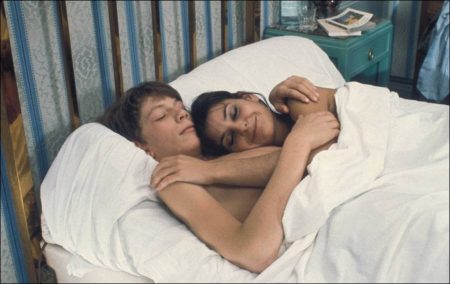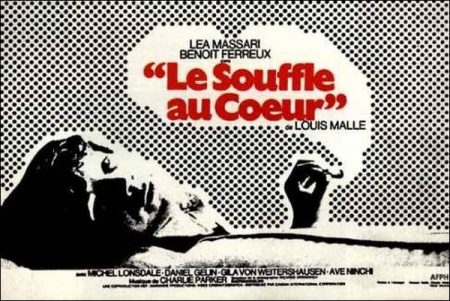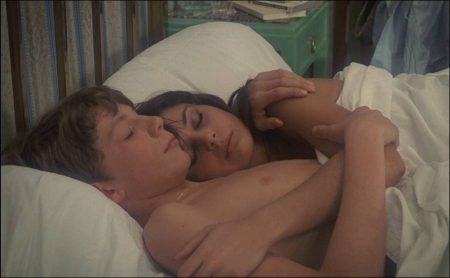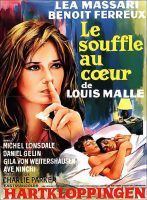Taglines: A young mother seduces her son… and it’s beautiful!
Le Souffle au Cœur movie storyline. Dijon, 1954. France is nearing the end of the first Indochina War, or the so-called “dirty” war, and the open-minded fifteen-year-old son of a wealthy gynaecologist, Laurent, enjoys a normal life. Favoured by his mother, the sensitive boy has acquired a taste for Jazz music, reading, and politics, as Laurent is on the brink of a great change in his life.
Driven by his ever-growing curiosity–Laurent, a Catholic schoolboy living under strict laws and regulations–will soon find the way to self-awareness, and love, as he experiences the thrill of his first kiss; of course, under his mother’s ever-watchful eye. In the end, when will this boy who is so closely attached to his mother, become a man?
Le Souffle au Cœur (English: Murmur of the Heart) is a 1971 French film by French director Louis Malle and starring Lea Massari, Benoît Ferreux and Daniel Gélin. Written as Malle’s semi-autobiography, the film tells a coming of age story about a 14-year-old boy growing up in bourgeois surroundings in post-World War II Dijon, France, with a complex relationship with his Italian mother.
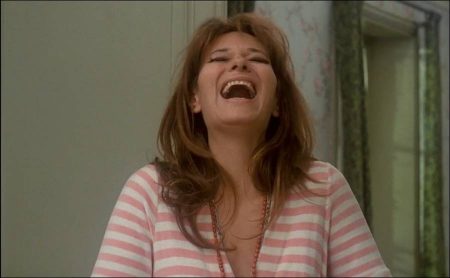
The film was screened at the 1971 Cannes Film Festival and was a box office success in France. In the United States, it received positive reviews and a nomination for the Academy Award for Best Original Screenplay.
Director Louis Malle wrote Murmur of the Heart in part as an autobiography. As Malle said, “My passion for jazz, my curiosity about literature, the tyranny of my two elder brothers, how they introduced me to sex— this is pretty close to home.” Malle also suffered from a heart murmur and shared a hotel room with his mother during treatment.
Aside from this, the film is a work of fiction, and takes place later than Malle’s true childhood. The humorous and earthy Italian mother is also a fictional character, based more on a friend’s mother than his own. Malle asserted in interviews that the incest, in particular, is fictional. He claimed that in writing the script, he had no intention to include incest, but ended up doing so as he explored an intense mother-son relationship.
Upon submitting his screenplay, the National Center of Cinematography raised objections to the perverse erotic scenes. Malle was surprised by the response. With the Censorship Board denying funding, the film was financed with the help of Mariane Film, a French subsidiary of Paramount Pictures. Given his love of jazz, and the fact that Laurent steals a Charlie Parker album at the beginning of the film, Malle used Parker’s music for the film score.
Film Review for Le Souffle au Cœur
In many ways, Louis Malle’s Le Souffle au Cœur seems like a typical coming-of-age film, especially European ones, which tend to aim for realism over slapstick and start younger than Hollywood’s equivalents. It features the usual adolescent introduction to adult vices, and in such a personal way that it’s no surprise to discover that Malle wrote it as a partial autobiography. However, even though the tone of the film is not at all critical of its touchy narrative, it dually serves as a comment on the coming-of-age-genre, and perhaps even the carelessness of the French bourgeoisie’s libertine approach to transitioning children into adulthood.
Benoît Ferreux stars as Laurent, an exceedingly bright 15-year-old boy who is nevertheless still very much a child. Unlike his rambunctious and troublesome older brothers, Laurent is sensitive, and deeply attached to his doting, sensuous Italian mother (Lea Massari) — although neither she nor Laurent’s detached doctor father (Daniel Gélin) offer much in the way of direct or positive parental influence.
With his friends, Laurent shoplifts and smokes cigarettes without censure; with his brothers, Laurent drinks wine, fools around with girls, and even visits a whorehouse, but the worst repercussions are mildly humiliating pranks at the hands of other kids and maybe a chiding from an exasperated housekeeper (Ave Ninchi). Michael Lonsdale appears as a priest with a reputation for taking slightly too much interest in his young male students, a quirk which inspires jokes amongst the kids and bemusement amongst the parents.
Set in 1954, it’s interesting to note that this generation of parents depicted in Le Souffle au Cœur is just one removed from France’s Vichy sympathizers, and seem just as content to go along without any major disruptions to their comfortable lifestyles. In a scene that is easy to overlook, Laurent comes across a parade of French war veterans beset by hecklers, suggesting perhaps that dereliction of responsibility still significantly afflicts France’s upper class.
In the form of a bawdy teen comedy, Le Souffle au Cœur paints an unsettling picture of the effects of unmanaged puberty; what’s the natural outcome of catapulting children into sex when their idea of love is still focused on their mother? It’s all very casually and yet poignantly done by Malle, with a tenderly damaged performance by Massari, and lingers powerfully in hindsight.
Le Souffle au Cœur (1971)
Directed by: Louis Malle
Starring: Lea Massari, Benoît Ferreux, Daniel Gélin, Ave Ninchi, Michael Lonsdale, Gila von Weitershausen, Fabien Ferreux, Micheline Bona, Liliane Sorval, Corinne Kersten, François Werner
Screenplay by: Louis Malle
Production Design by: Jean-Jacques Caziot
Cinematography by: Ricardo Aronovich
Film Editing by: Suzanne Baron
Makeup Department: Jacky Reynal
Music by: Gaston Frèche, Charlie Parker, Henri Renaud
MPAA Rating: None.
Distributed by: Orion Classics
Release Date: April 28, 1971 (France), October 20, 1971 (Italy)
Views: 1676
